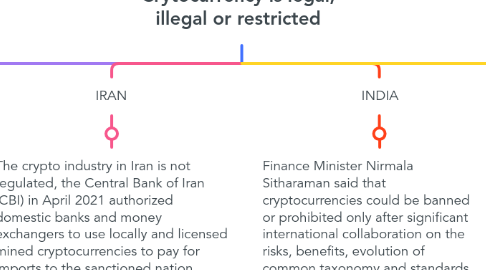Countries where Crytocurrency is legal, illegal or restricted
создатель maryam beg

1. ILLEAGAL
1.1. In 2018, Algeria passed a financial law—making all crypto transactions illegal. This includes holding and trading any digital assets. Any violation of the law is subjected to an offence and is punishable.
1.1.1. In 2014, Bolivia made crypto illegal. The Bolivian Central Bank issued a resolution that banned cryptos, instead of rug pull cases and scams which cost investors a fortune. According to the Bolivian government, cryptocurrencies should not be trusted as an investment.
1.1.1.1. China’s central bank in September 2021, made all cryptocurrency-related transactions illegal and put a blanket ban, sending the strongest signal yet of its determination to crack down on the industry. All cryptocurrencies, including Bitcoin and Tether, are not fiat currency and cannot be circulated on the market, the People’s Bank of China said on its website. “All crypto-related transactions, including services provided by offshore exchanges to domestic residents, are illicit financial activities, “the PBOC said in the statement.
1.1.1.1.1. Egypt has classified cryptocurrencies such as Bitcoin as prohibited under Islamic law. Dar al-Ifta, the country’s primary Islamic advisory body, issued a religious decree in 2018. The country 2020, tightened banking laws in September 2020 to prevent trading or promoting cryptos without a Central Bank licence.
2. LEGAL
2.1. Central African Republic - made Bitcoin a legal tender | April 2022
2.1.1. El Salvador- made Bitcoin a legal tender | September 2021
2.1.1.1. Cuba is the latest country to authorize and regulate cryptocurrencies like Bitcoin.
3. IRAN
3.1. The crypto industry in Iran is not regulated, the Central Bank of Iran (CBI) in April 2021 authorized domestic banks and money exchangers to use locally and licensed mined cryptocurrencies to pay for imports to the sanctioned nation. The country has a very ‘love-hate’ relationship with crypto. Iran announced a four-month ban on the energy-consuming mining of cryptocurrencies such as Bitcoin after cities suffered unplanned outages due to massive crypto-mining operations held in the country. Notably, around 4.5 per cent of the world’s Bitcoin mining takes place in Iran, which, according to blockchain analytics firm Elliptic.
4. INDIA
4.1. Finance Minister Nirmala Sitharaman said that cryptocurrencies could be banned or prohibited only after significant international collaboration on the risks, benefits, evolution of common taxonomy and standards. The Cryptocurrency and Regulation of Official Digital Currency Bill, 2021 is yet to be tabled by the government. The Bill seeks to prohibit all private cryptocurrencies in India, however, “it allows for certain exceptions to promote the underlying technology of cryptocurrency and its uses,” the document reads. India has levied a 30 per cent tax on crypto investors, and a 1 per cent TDS on every crypto intra-traders. Currently, India has not regulated cryptos but won’t legalise it as well. The country is “fairly ready” with its consultation paper on cryptocurrencies and has consulted domestic as well as institutional stakeholders including the World Bank and the International Monetary Fund, said Economic Affairs Secretary Ajay Seth.
5. RUSSIA
5.1. In January 2022, Russia’s central bank proposed banning the use and mining of cryptocurrencies on Russian territory, citing threats to financial stability, citizens’ well-being and its monetary policy sovereignty. The move is the latest in a global cryptocurrency crackdown as governments from Asia to the United States worry that privately operated and highly volatile digital currencies could undermine their control of financial and monetary systems.
6. USA
6.1. Cryptocurrencies are legal in the US. According to the U.S. Department of Treasury’s Financial Crimes Enforcement Network (FinCEN), Bitcoin is a convertible currency with an equivalent value to real currency or one that can act as a substitute for real currency. The Internal Revenue Service has also categorized Bitcoin as property for taxation purposes.

